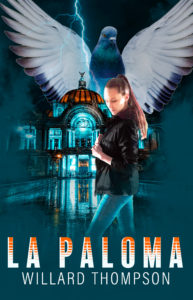La Paloma by Willard Thompson
Please welcome Willard Thompson author of La Paloma
Willard Thompson will be awarding a $15 Amazon or Barnes and Noble GC to a randomly drawn winner via rafflecopter during the tour.

La Paloma
byWillard Thompson
~~~~~~~~~~~~~
GENRE: suspense/adventure/romance
~~~~~~~~~~~~~
INTERVIEW:
- What or who inspired you to start writing?
Really, my inspiration to write came from my reading. My mother taught me to read and I began reading adult fiction at a pretty young age. I was blown away by some of the historical fiction I read, The Horatio Hornblower series, F. Van Wyke Mason and Kenneth Roberts books, and I decided I wanted to write stories like the men and women I was reading, telling exciting stories like they did. Most of the books I read in my youth were historical fictions, mostly about revolutions and pirates and dashing men who romanced beautiful women. Times were pretty simple back then, and I loved the fantasy worlds I was drawn into and wanted to tell stories like the ones I was reading.
- How did you come up with ideas for your books?
Until recently I have not given much thought to how my stories come to me but looking back, I can see a pattern. My stories always start with a character and more than likely that character will be a young woman, like Teresa Diaz in La Paloma. Occasionally it will be a young man, like Will Thornton in my adventure/romance Delfina’s Gold.The character will haunt me, always popping up in my thoughts. If she or he stays in my mind long enough I will eventually connect the character with a theme. In La Palomaan important theme is Teresa’s struggle to know her true identity, which world she belongs in—American or Mexican. Before long a story unfolds, which is to say I do not plot; stories reveal themselves.
- What expertise did you bring to your writing?
I could not have written La Palomawithout a good knowledge of Mexico and its history. Maybe I wouldn’t call it expertise, but I have been in Mexico more than a dozen times, not just as a tourist, but also doing business there where I learned about the people. Mexico is a beautiful land sadly burdened with economic woes and a terrible crime rate. Those facts form the background of La Paloma. The other part is research. I never begin to write until I feel I have thoroughly researched my story.
- As far as your writing goes, what are your future plans?
I mentioned that my story ideas usually come from the creation of a character. Well, I have a new character that won’t leave me thoughts. She is a young woman living in early southern California on a large rancho with her father and sisters during the time when the ranching business goes bad and her father is losing everything. Stay tuned or stay in touch to see if the story geminates into a new adventure/romance
- If you could be one of the characters from any of your books, who would it be and why?
I am well respected for the female characters I’ve created. Don’t ask how I do it, I can’t explain how I do it, but I know I do it well. However, I wouldn’t want to be one of those women for they are almost always in crisis. Far and away, the male character I would most like to be is Will Thornton, a young Bostonian who sails to California in the 1830s to make his fortune. He has a passionate romance with the title character of the book, a beautiful Mexican girl named Delfina, (Delfina’s Gold) but it is an ill-fated romance. Will has many obstacles to overcome, some personal and some story-based, and he is clearly a flawed character, but I like the way he persists when the obstacles of life present challenges.
- If you were the casting director for the film version of your novel, who would play your leading roles?
There are so many talented and beautiful young Latinas today I would be happy to have any of them play the role of Teresa in a movie of La Paloma. Javier, the primary main character is the son of a cartel boss so I see him and his father as characters similar to the same roles in The God Father series. To be clear, though La Palomais not a particularly gritty or bloody story. Of necessity it included cartel figures, but it is much more of a coming of age story about a young woman struggling with her identity.
- Do you belong to a critique group? If so how does this help or hinder your writing?
I do not currently below to a critique group, but I have in the past. Now, I have a group of what I call Beta readers, people I trust to give me honest feedback on the early versions of my stories. Over the years I have benefited from critique groups when I knew and trusted the other members, but new writers should be careful showing their work to people they don’t know and trust. There are bad people in writing groups just as there are in all other walks of life. The best situation is for a young writer to work with a writing coach. I am a writing coach to several new writers and I love working with them. They can contact me at WillardThompsonBooks.com
- When did you first decide to submit your work? Please tell us what or who encouraged you to take this big step?
My first novel, Dream Helper, was highly praised by a critique group and won an award at the Santa Barbara Writers Conference. Both events encouraged me to submit my work to publishers. After I wound up with about 100 rejection letters, I took the manuscript to a meeting with a prominent editor in New York. She explained the fact of life to me, that new writers have an extraordinarily impossible time getting published. Sorry to be so down on publishers. I decided then to independently publish Dream Helperand it won a gold medal. I have never looked back.
- Do you outline your books or just start writing?
Never! I don’t outline because plotting is too mechanical for the way my mind works. I firmly believe a story has to develop organically or readers will be disappointed with the result. By organicly, I mean one scene or crisis or whatever, must following naturally, organically, from the one before. And you cannot know how that happens without writing it. Readers who read La Palomawill understand what I mean by organic writing. You don’t know what will happen next but ultimately it comes naturally from what has gone before.
- Do you have an all time favorite book?
No, but I have a short list. John Steinbeck’s Grapes of Wrathand East of Edenare on it, So are a couple of Wallace Stegner’s, Edith Wharton’s and A.B. Gutherie Jr.’s. I’d put John Grisham, Gustave Flaubert, Toni Morrison. Tana French and Michael Connelly in the top group too.
- Can you tell us a little about the black moment in your book?
La Palomais written in the first person, present tense. That means Teresa is not telling you the story of what happened to her, you are experiencing it with her. I write so that the author (me) is essentially not present in the telling. To talk about any event therefore is unfair to my potential readers. But suffice to say, this is a page turner and early reviews say readers can’t put it down.
- Can you tell us a little bit about what it was like to write a series.
The only series I have written is The Chronicles of California, a three-book series consisting of Dream Helper. Delfina’s Goldand Their Golden Dreams. It didn’t start out to be a trilogy. One book got written and the strong characters let to a second, etc. The books were written over several years. I am always very close to my characters, so it was a pleasant experience spending so much time with them.
- Anything else you might want to add?
I look forward to dialoging with your viewers about La Palomaand the current events that inspired me to write the novel as well as about my other books if they care to ask .

BLURB:
When Teresa Diaz’s father is arrested in an ICE raid in a Los Angeles area city and deported back to Mexico, her family begins to come apart. She is a student at UCLA on a scholarship for undocumented aliens (Dreamers) looking to have a life in the U.S. in communications. Her brother in High school and her elementary school sister begin having serious troubles without a father in the household.
At work in a fast-food drive-through, Teri, as she wants to be known is approached by a Mexican gangbanger who offers to take you to her father. Doubting the guy wants more than picking her up, she resists, but day by day, as her sister is sent home from school and her brother is brought home dunk by the police, she gives in and goes across the border with him. Against her wishes, he takes her to a beach house in Tijuana and leaves her. She learns that illegal activities are going on in the house but without transportation, and without a birth certificate –either Mexican or American– she can’t cross the border alone.
After several days, virtually a prisoner, the owner of the house, a fat woman known as Mama Gorda arranges to get her across the border with a young Mexican man who rides a fast motorcycle. On the way, he takes her to lunch and there offers to talk her deeper into Mexico to find her father. She agrees, travels in his private plane and begins a romance while searching for her father in Michoacan state. The more she becomes involved, the more she is involved in activities she doesn’t understand but suspects they’re illegal.
Returning to Monte Vista, her LA area home, still without her father, she finds she can no longer return to UCLA, seeks a job, connects with a Latina who bullied her he school. When her brother is arrested for jobbery, Teri returns to Mexico seeking help from the people she suspects to belong to a cartel.
Ultimately, she is sponsored by the people in Mexico to participate in the Miss Mexico contest, not realizing it is the Cartel that is promoting her. In the end, she will face a life-changing decision whether to continue her romance with the son of the cartel’s head or try to stand on her own. And whether to remain in Mexico or return to LA.
~~~~~~~~~~~~~
EXCERPT:
Stepping off the bus from Westwood in Monte Vista is like stepping into an alternate reality for me. Two white-haired Mexicans wearing droopy mustaches and ostrich boots are sitting like statues on the bus stop bench. As I start off toward home, they talk to each other in short, machine-gun-like, bursts of Spanish. One looks up as I pass. “Hola, Señorita,” he says, smiling so I can see his tobacco-stained teeth, “Often I see you at this time. From where are you coming?”
I have no idea who he is, but I return his smile. “From UCLA,” I tell him.
He nods. “Ah, Trojans,” and lapses back into silence.
“No. Bruins,” I tell him, and keep going, smiling to myself. It must have been the tenth time the old man had asked me the same question.
The air is heavy with the aroma of simmering pork from a taqueria I pass, but it morphs into the smell of warm bolillos at the panadería next door. Farther along, three middle-aged women in drab house dresses, stockings rolled down to mid-calf, stand at a table of Norteño CDs. They’re listening to Ramon Ayala’s voice coming from inside the store and chatting back and forth.
Hurrying home, I pass two big-bellied teenage girls pushing baby carriages. They stop to look up at the marque of our movie theater showing “Sicario: Day of the Soldado” and then admire the riot of red, white, and green piñatas hanging in the doorway of a shop spilling all sorts of imported merchandise onto the street.
When Connie, my little sister, was a toddler, she used to be dazzled by the sights and smells of the stores along Peck Road. Even now, a curious fourth grader, she loves to linger over the assortment of trinkets when papa takes her window shopping.
I never liked these shops the way Connie does. For me, Monte Vista is my nightmare, haunting me with the memory of little Antonio. It isn’t my world. The bus to Westwood each morning is my escape, three buses actually, and two hours each way.
“This is your culture, Paloma. Your people,” my papa used to tell me, holding my hand, walking together up Peck Road to Mass on Sundays. “Embrace it,” he would say. “Es lo que somos.”
“I hate it, Papa,” I told him. “I want to be an American girl.”
Two shaved-headed gangbangers in baggy clothes, begin following me down the street, trash-talking to my back.
“Did ya see the nice tits on her?” one of them says loud enough for everyone on the sidewalk to hear. “They were peeking out at me on the bus. How soft they would feel in my hand.”
I cringe and quicken my pace. I want to turn around and tell them to leave me alone, but I know to keep my mouth shut. There are enough people on the street that I feel safe.
“But her legs, man,” the other one responds. “Think how those long legs would feel wrapped around your neck.”
I do my best to shut out their words. I speed up, but they keep pace. Men and women on the sidewalk give them a wide birth.
At Garvey Avenue, they turn left after shouting obscene good-byes that describe what they would do to me if they ever got me alone. When they disappear down the street, I feel the tension release from my shoulders.
Only neighborhood people are sitting about on their porches when I reach Magnolia, my street of small, pinched, two-story stucco houses, with iron-barred windows and doors, secure behind chain-link fences. Our little house, two in from the corner, is my father’s pride. Even though it’s rented, he always has the best-looking lawn and garden on the block. At Christmas, our house is a riot of blinking colored lights, competing with the neighbors’ over-the-top decorations for the gaudiest display award.
A boy in a navy watch cap straddles his bike on the corner, chatting up three girls. They are twelve- or thirteen-year-olds, heavy with makeup and budding breasts, competing with each other for the boy’s attention.
Across the street, an older couple sits in folding chairs by their front door. Protected by their chain-link fence, they watch the teenagers while tending a small hibachi on their front stoop.
“Hello, Mama,” I call out in the direction of the kitchen, heading for the staircase. “You home? I smell dinner.”
“Teresa Maria, come back here.”
My mama hurries into the hall. Wiping her hands on her apron, she comes to the bottom of the stairs. “Your papa not home yet.”
“Probably stopped for a beer with the men, Mama. I’m late for work.”
“You eat with us when he gets home,” she scolds.
I continue to the top of the stairs. “I have a test tomorrow, Mama. No time to eat anyway. Hey, you,” I call out as I go past my brother’s room. I get a grunt in return. I stop and backtrack to his doorway.
“How was practice?”
“I did good, Teri. Coach says some guys from the junior college will be lookin’ at me during the season.”
“You, the man,” I say. Then give him a more serious look. “How was the math test?”
“Not so hot.”
“I can help.”
“Yeah. Maybe.” It’s Rico’s standard response.
Connie and I share a room. Busy with scissors and paste on a school project, she looks up and greets me with an ear-to-ear smile, showing missing front teeth.
“How was school?”
“I’m making a hand puppet, Teresa,” she squeals with glee, sweeping her dark bangs out of her eyes with the back of her hand. “We’re having a puppet show in class tomorrow. Do you like my wolf?”
“Cool,” I tell her. “He looks big and bad.”
I change into my uniform, throwing my hair into a ponytail and fastening the red and gold baseball cap around it. Before leaving the room, I kneel by the side of the bed, facing the icon of the Virgin on my night table. I whisper a prayer for Antonio. Connie stays respectfully quiet. When I finish, I hurry back downstairs. Opening the front door, I call over my shoulder, “I’ll eat at work, Mama. Tell papa hello.”
“No good for you,” I hear from the kitchen. I start back up the street.
I get off work at eleven. Dreading two hours of cramming still ahead, I hurry home. I keep throwing quick looks over my shoulder, thinking about the gangbangers. Turning the corner onto Magnolia, I’m startled to see my house ablaze with light. I stop for a moment and stare. The house should be dark, with everyone in bed. I run. The front door is open. Silhouetted just inside the living room, Mama sits hunched over on the edge of the couch. Coming closer, I can see she’s crying.
“Mama…” I run the last few steps to embrace her. “What’s the matter?”
“He don’t come home, Teresa Maria.” A sob escapes her throat.
I start to feel apprehensive. My father doesn’t hang out drinking with other men “Did you call around, Mama? That’s not like him.”
“No one see him.” She starts crying again. I put my arms around her, holding her until she stops crying. We talk about what to do.
“Don’t call the police,” she warns me.
She agrees to let me call County Hospital. I ask the woman who answers if José Diaz has been admitted to the Emergency Room. She is impatient, telling me there are four Diazs in her computer just now, and it would take her several minutes to pull up each one to see if any are in Emergency. “I’ll wait,” I tell her, adding a little attitude to my voice. “This is important.”
Papa was not there.
~~~~~~~~~~~~~

AUTHOR Bio and Links:
La Paloma is Willard Thompson new suspense/adventure/romance novel inspired by current headlines. It’s set in present day Los Angeles, California, and various cities in Mexico.
The Girl from the Lighthouse published last year is Thompson’s Award-winning historical romance set in California and Paris, France in the 1870s.
He is the gold medal-winning author of Dream Helper, the first in The Chronicles of California series of three historical novels set in the early days of the Golden State. He and his wife live in Santa Barbara, California.
Buy links:
Amazon: https://www.amazon.com/Paloma-Novel-Willard-Thompson-ebook/dp/B0842DGB6Q/
Barnes and Nobles: https://www.barnesandnoble.com/w/la-paloma-willard-thompson/1136266389
~~~~~~~~~~~~~
GIVEAWAY INFORMATION and RAFFLECOPTER CODE:
Willard Thompson will be awarding a $15 Amazon or Barnes and Noble GC to a randomly drawn winner via rafflecopter during the tour.


